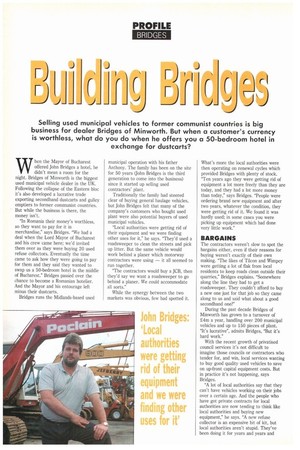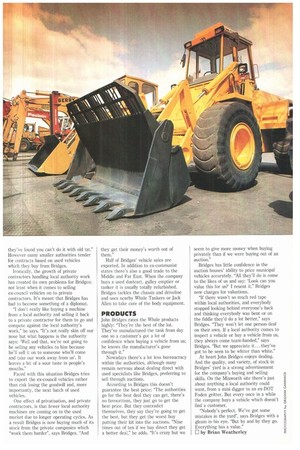Selling used municipal vehicles to former communist countries is big
Page 40

Page 41

If you've noticed an error in this article please click here to report it so we can fix it.
business for dealer Bridges of Minworth. But when a customer's currency is worthless, what do you do when he offers you a 50-bedroom hotel in exchange for dustcarts?
When the Mayor of Bucharest offered John Bridges a hotel, he didn't mean a room for the night. Bridges of Minworth is the biggest used municipal vehicle dealer in the UK. Following the collapse of the Eastern bloc it's also developed a lucrative trade exporting secondhand dustcarts and gulley emptiers to former communist countries. But while the business is there, the money isn't.
"In Romania their money's worthless, so they want to pay for it in merchandise," says Bridges. "We had a deal when the Lord Mayor of Bucharest and his crew came here; we'd invited them over as they were buying 20 used refuse collectors. Eventually the time came to ask how they were going to pay for them and they said they wanted to swap us a 50-bedroom hotel in the middle of Bucharest." Bridges passed over the chance to become a Romanian hotelier. And the Mayor and his entourage left minus their dustcarts.
Bridges runs the Midlands-based used municipal operation with his father Anthony. The family has been on the site for 50 years (John Bridges is the third generation to come into the business) since it started up selling used contractors' plant.
Traditionally the family had steered clear of buying general haulage vehicles, but John Bridges felt that many of the company's customers who bought used plant were also potential buyers of used municipal vehicles.
"Local authorities were getting rid of their equipment and we were finding other uses for it," he says. "They'd used a roadsweeper to clean the streets and pick up litter. But the same vehicle would work behind a planer which motorway contractors were using — it all seemed to run together.
"The contractors would buy a JCB, then they'd say we want a roadsweeper to go behind a planer. We could accommodate all sorts."
While the synergy between the two markets was obvious, few had spotted it. What's more the local authorities were then operating on renewal cycles which provided Bridges with plenty of stock. "Ten years ago they were getting rid of equipment a lot more freely than they are today, and they had a lot more money than today," says Bridges. 'People were ordering brand new equipment and after two years, whatever the condition, they were getting rid of it. We found it was hardly used; in some cases you were picking up equipment which had done very little work."
BARGAINS
The contractors weren't slow to spot the bargains either, even if their reasons for buying weren't exactly of their own making. "The likes of Tilcon and Wimpey were getting a lot of flak from local residents to keep roads clean outside their quarries," Bridges explains. "Somewhere along the line they had to get a roadsweeper. They couldn't afford to buy a new one just for that job so they came along to us and said what about a good secondhand one?"
During the past decade Bridges of Minworth has grown to a turnover of Zcim a year, handling over 200 municipal vehicles and up to 150 pieces of plant. "It's lucrative", admits Bridges, "But it's hard work."
With the recent growth of privatised council services it's not difficult to imagine those councils or contractors who tender for, and win, local services wanting to buy good quality used vehicles to save on up-front capital equipment costs. But in practice it's not happening, says Bridges.
"A lot of local authorities say that they can't have vehicles working on their jobs over a certain age. And the people who have got private contracts for local authorities are now tending to think like local authorities and buying new equipment," he says. "A new refuse collector is an expensive bit of kit, but local authorities aren't stupid. They've been doing it for years and years and they've found you can't do it with old tat." However many smaller authorities tender for contracts based on used vehicles which they buy from Bridges.
Ironically, the growth of private contractors handling local authority work has created its own problems for Bridges: not least when it comes to selling ex-council vehicles on to private contractors. It's meant that Bridges has had to become something of a diplomat.
"I don't really like buying a machine from a local authority and selling it back to a private contractor for them to go and compete against the local authority's work," he says. "It's not really skin off our nose but what happens is the authority says: 'Well sod that, we're not going to be selling any vehicles to him because he'll sell it on to someone who'll come and take our work away from us'. It leaves a bit of a sour taste in people's mouths."
Faced with this situation Bridges tries to export the ex-council vehicles rather than risk losing the goodwill and, more importantly, the next batch of used vehicles.
One effect of privatisation, and private contractors, is that fewer local authority machines are coming on to the used market due to longer operating cycles. As a result Bridges is now buying much of its stock from the private companies which "work them harder", says Bridges. "And they get their money's worth out of them."
Half of Bridges' vehicle sales are exported. In addition to ex-communist states there's also a good trade to the Middle and Far East. When the company buys a used dustcart, gulley emptier or tanker it is usually totally refurbished. Bridges tackles the chassis and driveline and uses nearby Whale Tankers or Jack Allen to take care of the body equipment.
PRODUCTS
John bridges rates the Whale products highly: "They're the best of the lot. They've manufactured the tank from day one so a customer's got a lot of confidence when buying a vehicle from us; he knows the manufacturer's gone through it."
Nowadays there's a lot less bureaucracy within the authorities, although many remain nervous about dealing direct with used specialists like Bridges, preferring to sell through auctions.
According to Bridges this doesn't guarantee the best price: "The authorities go for the best deal they can get, there's no favouritism, they just go to get the best price. But they contradict themselves, they say they're going to get the best, but they get the worst buy putting their kit into the auctions. "Nine times out of ten if we buy direct they get a better deal," he adds. "It's crazy but we seem to give more money when buying privately than if we were buying out of an auction."
Bridges has little confidence in the auction houses' ability to price municipal vehicles accurately. "All they'll do is come to the likes of us and say: 'Look can you value this for us?' I resent it." Bridges now charges for valuations.
"If there wasn't so much red tape within local authorities, and everybody stopped looking behind everyone's back and thinking everybody was bent or on the fiddle they'd do a lot better," says Bridges. "They won't let one person deal on their own. If a local authority comes to inspect a vehicle or buy a vehicle from us, they always come team-handed," says Bridges. "But we appreciate it...they've got to be seen to be whiter than white."
At heart John Bridges enjoys dealing. And the quality, and variety, of stock in Bridges' yard is a strong advertisement for the company's buying and selling skills. On the Minworth site there's just about anything a local authority could want, from a mini digger to an ex-DOT Foden gritter. But every once in a while the company buys a vehicle which doesn't find a customer.
"Nobody's perfect. We've got some mistakes in the yard", says Bridges with a gleam in his eye. "But by and by they go. Everything has a value."
0 by Brian Weatherley
























































































